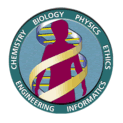|
Basic
Information About
the Project Medicine
& Ethical,
Legal, Education Research
Publications
|
Quick Links to this Page
Genetic counselors are health professionals with specialized graduate degrees and experience in the areas of medical genetics and counseling. Most enter the field from a variety of disciplines, including biology, genetics, nursing, psychology, public health, and social work. Genetic counselors work as members of a healthcare team, providing information and support to families who have members with birth defects or genetic disorders and to families who may be at risk for a variety of inherited conditions. They identify families at risk, investigate the problem present in the family, interpret information about the disorder, analyze inheritance patterns and risks of recurrence, and review available options with the family. Genetic counselors also provide supportive counseling to families, serve as patient advocates, and refer individuals and families to community or state support services. They serve as educators and resource people for other healthcare professionals and for the general public. Some counselors also work in administrative capacities. Many engage in research activities related to the field of medical genetics and genetic counseling. See the National Society of Genetic Counselors' definition.
National Resources for Locating Genetic Counselors By Area
Genetic counselors hold a Master's degree from one of over 30 accredited U.S. graduate programs. International training programs are also available. Students in these programs study genetics, psychosocial theory, ethics, and counseling. They also participate in clinical training. Certification is obtained through successful completion of documented clinical experience and the American Board of Genetic Counseling's examination. A listing of genetic counseling training programs is available through the National Society of Genetic Counselors. Genetic counseling is a growing field that offers opportunities in a variety of areas. Among the possibilities are
Average income for genetic counselors with a master's degree and 5-9 years experience in 2006 was $61,268. Median salary for a typical genetic counselor in 2008 in the United States was $54,832. General Resources
Genetic Counseling FAQs
Career Information
Books
A special thanks to Meghan E. Carey, Executive Director, National Society of Genetic Counselors (www.nsgc.org) for her review and updates to this page. Send the url of this page to a friend |
Last modified: Wednesday, September 17, 2008
Home * Contacts * Disclaimer
Base URL: www.ornl.gov/hgmis
![]() Site sponsored by the U.S. Department of Energy
Office of Science, Office
of Biological and Environmental Research, Human
Genome Program
Site sponsored by the U.S. Department of Energy
Office of Science, Office
of Biological and Environmental Research, Human
Genome Program

